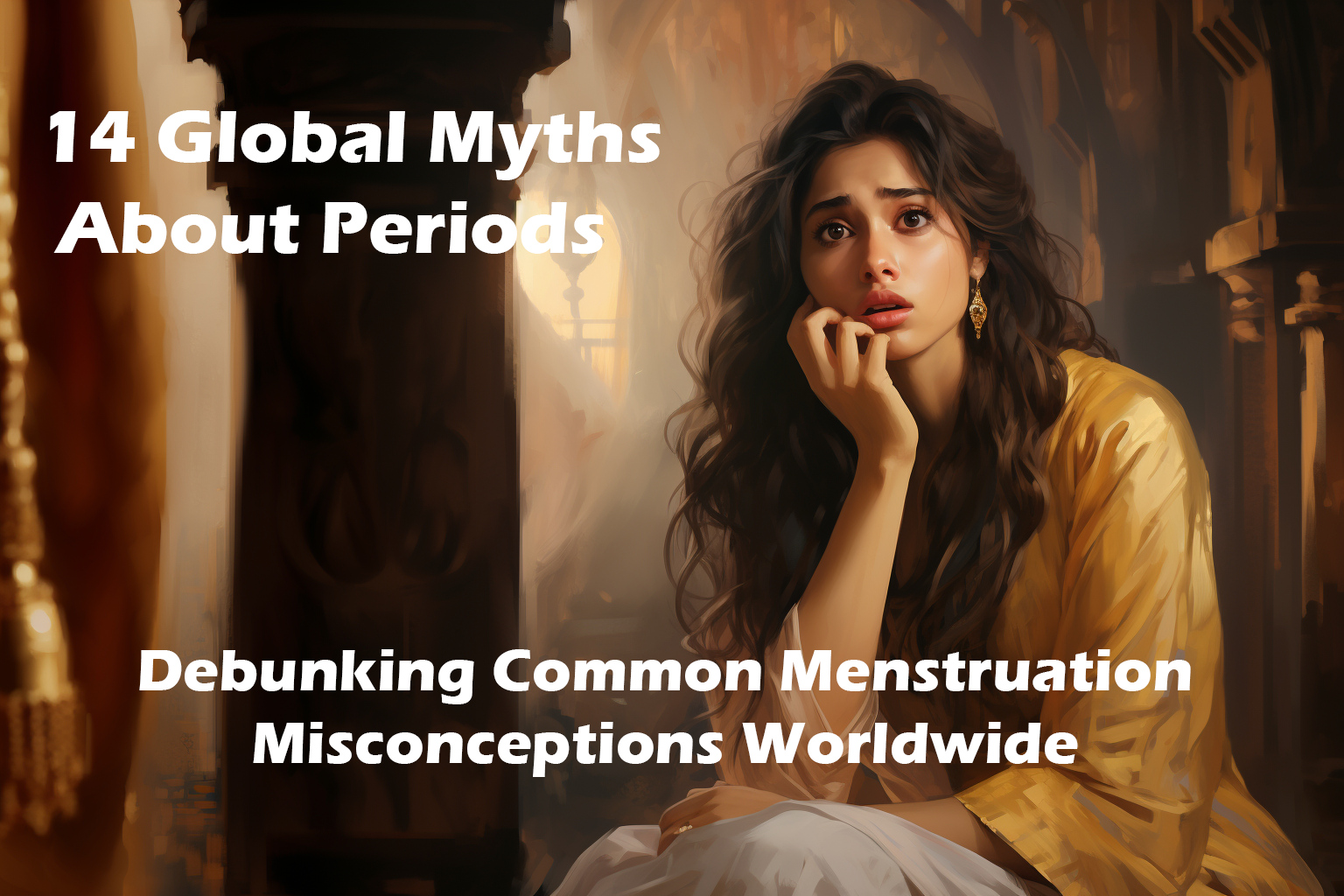
Introduction to Menstrual Cycles
The menstrual cycle is a natural process that occurs in the female reproductive system, typically on a monthly basis. It plays a crucial role in preparing the body for pregnancy. The cycle involves various stages, including the thickening of the uterine lining, the release of an egg from the ovaries (ovulation), and the shedding of the uterine lining (menstruation) if pregnancy doesn’t occur.
The average menstrual cycle lasts about 28 days, but it can vary from person to person. Some women may have shorter cycles of 21 days, while others may experience longer cycles of 35 days or more. The menstrual cycle is regulated by a complex interplay of hormones, including estrogen, progesterone, follicle-stimulating hormone (FSH), and luteinizing hormone (LH).
Menstruation, commonly referred to as a ‘period,’ is the monthly bleeding that occurs when the body sheds the uterine lining. It usually lasts between 3 to 7 days. The onset of menstruation, known as menarche, typically occurs in early adolescence and signifies the beginning of a woman’s reproductive years. Menstruation continues until menopause, which usually occurs in a woman’s late 40s to early 50s.
Understanding the menstrual cycle is essential not only for those who experience it but also for society at large. It helps in recognizing the signs of potential reproductive health issues and understanding the various factors that can influence the regularity and duration of periods. In the subsequent chapters, we will delve deeper into the reasons that can cause periods to delay.
The Normal Menstrual Cycle
The typical menstrual cycle is divided into several phases, each characterized by specific hormonal changes and events in the reproductive system. The cycle begins with the menstrual phase, during which the uterine lining is shed, resulting in menstruation or a period. This phase usually lasts between 3 to 7 days. Following the menstrual phase is the follicular phase, where the body prepares for ovulation. During this time, the pituitary gland releases follicle-stimulating hormone (FSH), which stimulates the growth of follicles in the ovaries. As the follicles mature, they produce estrogen, which thickens the uterine lining. Ovulation occurs around the middle of the cycle, typically around day 14 for a 28-day cycle. During ovulation, a mature egg is released from the ovary and travels down the fallopian tube, ready for fertilization. The luteal phase follows ovulation. If the egg is not fertilized, estrogen and progesterone levels drop, and the body prepares to shed the uterine lining once again. Understanding the typical menstrual cycle is crucial as it provides a baseline to identify any irregularities or delays.
Hormonal Imbalances
Hormonal imbalances are one of the primary reasons for delayed or irregular menstrual cycles. The menstrual cycle is regulated by a delicate balance of hormones, mainly estrogen and progesterone. Any disruption in their levels can lead to irregularities in the cycle. Several factors can cause hormonal imbalances, including:
Stress: Chronic stress can lead to elevated cortisol levels, which can disrupt the balance of reproductive hormones.
Poor Diet: A diet lacking essential nutrients can affect hormone production and balance.
Polycystic Ovary Syndrome (PCOS): This condition is characterized by elevated levels of male hormones, which can disrupt the menstrual cycle.
Thyroid Disorders: Both hyperthyroidism and hypothyroidism can affect menstrual regularity due to their influence on reproductive hormones.
Pituitary Tumors: Though rare, tumors in the pituitary gland can affect the production of reproductive hormones.
Premature Ovarian Failure: This condition occurs when the ovaries stop producing eggs earlier than usual, leading to decreased estrogen levels.
It’s essential to identify and address the root cause of hormonal imbalances to restore menstrual regularity. Consulting a healthcare professional can provide insights into potential imbalances and recommend appropriate treatments.
Stress and Its Impact
Stress, whether physical or emotional, can have a profound impact on the menstrual cycle. The body’s response to stress involves the release of stress hormones, including cortisol. Elevated cortisol levels can interfere with the production and balance of reproductive hormones, leading to menstrual irregularities or delays.
The hypothalamus, a region in the brain, plays a pivotal role in regulating the menstrual cycle. It releases gonadotropin-releasing hormone (GnRH), which signals the pituitary gland to produce follicle-stimulating hormone (FSH) and luteinizing hormone (LH). These hormones, in turn, regulate the ovaries’ function. However, in stressful situations, the hypothalamus may reduce or halt the production of GnRH, leading to a cascade effect on the entire menstrual cycle.
Several types of stress can impact the menstrual cycle:
Emotional Stress: Personal issues, work-related stress, or significant life changes can lead to emotional turmoil, affecting the regularity of periods.
Physical Stress: Illness, extreme weight loss, or excessive physical activity can strain the body, leading to menstrual irregularities.
Traumatic Events: Experiencing traumatic events can have long-lasting effects on the menstrual cycle due to the body’s prolonged stress response.
It’s essential to recognize the signs of stress and adopt coping mechanisms, such as relaxation techniques, exercise, and seeking support. Addressing stress can help in restoring menstrual regularity and overall well-being.
Weight Fluctuations
Weight fluctuations, both sudden weight gain and weight loss, can have a significant impact on menstrual regularity. The body’s fat cells play a role in estrogen production, and any drastic changes in body weight can disrupt the balance of this hormone, leading to menstrual irregularities or delays.
Weight Gain: Rapid weight gain, especially if it leads to obesity, can result in increased estrogen production. Excess estrogen can prevent the ovaries from releasing an egg, leading to anovulatory cycles. Anovulatory cycles are menstrual cycles where ovulation does not occur, which can result in irregular or missed periods. Additionally, obesity is often associated with insulin resistance, which can lead to elevated insulin levels. High insulin can cause the ovaries to produce more male hormones, further disrupting the menstrual cycle.
Weight Loss: On the other hand, rapid weight loss or being underweight can lead to decreased estrogen production. Low body fat can reduce the body’s ability to produce adequate estrogen, leading to thinning of the uterine lining and missed periods. Conditions like eating disorders, such as anorexia or bulimia, can result in significant weight loss and menstrual irregularities.
It’s essential to maintain a healthy weight to ensure menstrual regularity. If one is experiencing weight-related menstrual irregularities, it’s crucial to consult a healthcare professional. They can provide guidance on achieving and maintaining a healthy weight and addressing any underlying health concerns.
Polycystic Ovary Syndrome (PCOS)
Polycystic Ovary Syndrome (PCOS) is a common hormonal disorder that affects individuals with ovaries, especially during their reproductive years. It is characterized by prolonged or infrequent menstrual periods and higher levels of male hormones (androgens).
Symptoms of PCOS include:
Irregular Periods: This is the most common symptom. Periods might be infrequent, irregular, or prolonged.
Heavy Bleeding: The periods you do get can be heavier than usual.
Excess Androgen: Elevated levels of male hormones may result in physical signs such as excess facial and body hair, severe acne, and male-pattern baldness.
Polycystic Ovaries: The ovaries might be enlarged and contain follicles that surround the eggs. As a result, the ovaries might fail to function regularly.
Infertility: PCOS is a common cause of infertility.
The exact cause of PCOS is unknown, but several factors, including insulin resistance, inflammation, and hereditary factors, play a role. Insulin resistance can lead to elevated insulin levels, causing the ovaries to produce more male hormones. Inflammation has also been linked to higher androgen levels.
PCOS can lead to various complications, including infertility, metabolic syndrome, sleep apnea, depression, and endometrial cancer. Early diagnosis and treatment can help manage the symptoms and reduce the risk of long-term complications. Treatment options might include lifestyle changes, medications, and addressing infertility issues.
Thyroid Issues
The thyroid gland, located in the neck, plays a pivotal role in regulating the body’s metabolism through the production of thyroid hormones. These hormones influence various bodily functions, including the menstrual cycle. Disorders of the thyroid gland can lead to menstrual irregularities, including delayed or missed periods.
There are two primary thyroid disorders that can impact menstrual regularity:
Hyperthyroidism: This condition is characterized by an overactive thyroid gland that produces excessive amounts of thyroid hormones. Symptoms of hyperthyroidism include rapid heartbeat, weight loss, increased appetite, and anxiety. In terms of menstrual impact, hyperthyroidism can lead to lighter and less frequent periods.
Hypothyroidism: In contrast, hypothyroidism is a condition where the thyroid gland is underactive and produces insufficient thyroid hormones. Symptoms include fatigue, weight gain, dry skin, and sensitivity to cold. Hypothyroidism can result in heavier and more frequent periods.
Both hyperthyroidism and hypothyroidism can interfere with ovulation, leading to difficulties in conceiving. Additionally, untreated thyroid disorders can lead to other complications, such as heart problems or osteoporosis.
It’s essential to be aware of the symptoms of thyroid disorders and seek medical advice if any irregularities are noticed. Regular check-ups and blood tests can help in early diagnosis and treatment, ensuring menstrual regularity and overall health.
Medications and Their Effects
Various medications can influence menstrual regularity, leading to delayed, missed, or irregular periods. It’s essential to be aware of these potential side effects and consult a healthcare professional if any menstrual irregularities are observed while on medication.
Some medications known to impact menstrual cycles include:
Hormonal Contraceptives: Birth control pills, patches, and intrauterine devices (IUDs) release hormones that can prevent ovulation and alter the menstrual cycle. Some may lead to lighter periods, while others might cause missed periods.
Antipsychotics: Some antipsychotic medications can elevate prolactin levels, leading to menstrual irregularities.
Antidepressants: Certain antidepressants can affect the menstrual cycle, although the exact mechanism is not always clear.
Chemotherapy: Chemotherapy drugs used to treat cancer can lead to temporary or permanent changes in the menstrual cycle.
Antihypertensives: Some blood pressure medications can influence menstrual regularity.
Epilepsy Medications: Drugs used to treat epilepsy can affect the menstrual cycle and hormone levels.
It’s crucial to discuss potential side effects with a healthcare provider before starting any medication. If menstrual irregularities are observed, it might be possible to switch to an alternative medication or adjust the dosage to mitigate the effects on the menstrual cycle.
Chronic Diseases and Conditions
Chronic diseases and conditions can have a profound impact on menstrual regularity. The body’s response to chronic illnesses often involves hormonal changes, which can directly or indirectly influence the menstrual cycle. Here are some chronic diseases and conditions that can lead to menstrual irregularities:
Diabetes: Poorly controlled diabetes can lead to menstrual irregularities due to the impact of insulin on hormone regulation.
Celiac Disease: This autoimmune disorder affects the small intestine and can lead to menstrual irregularities if untreated.
Endometriosis: This condition involves the growth of uterine tissue outside the uterus, leading to painful periods and potential menstrual irregularities.
Uterine Fibroids: These noncancerous growths in the uterus can cause heavy bleeding and irregular periods.
Chronic Kidney Disease: Kidney dysfunction can lead to hormonal imbalances, affecting the menstrual cycle.
Pituitary Tumors: Though benign, these tumors can affect the production of reproductive hormones, leading to menstrual irregularities.
It’s essential to manage chronic diseases and conditions effectively to ensure menstrual regularity. Regular check-ups, appropriate treatments, and lifestyle modifications can help in managing these conditions and their impact on the menstrual cycle. If one is diagnosed with a chronic condition and notices menstrual irregularities, it’s crucial to consult a healthcare professional to address both the disease and its effects on menstruation.
Lifestyle Factors
Lifestyle factors can significantly influence menstrual regularity. Daily habits, routines, and choices can either support a regular menstrual cycle or lead to disruptions and delays. Here are some lifestyle factors that can impact menstrual cycles:
Excessive Exercise: While regular exercise is beneficial for overall health, excessive physical activity can lead to missed or irregular periods. Athletes or individuals who engage in intense training sessions might experience amenorrhea (absence of menstruation) due to reduced body fat and stress on the body.
Travel: Frequent travel, especially across time zones, can disrupt the body’s internal clock, leading to menstrual irregularities. The body might take time to adjust to new routines and schedules, affecting the menstrual cycle.
Poor Nutrition: A diet lacking essential nutrients can impact hormone production and balance. For instance, extremely low-calorie diets or diets deficient in fats can reduce estrogen levels, leading to menstrual irregularities.
Smoking and Alcohol: Excessive alcohol consumption and smoking can lead to hormonal imbalances, affecting menstrual regularity.
Lack of Sleep: Consistent sleep patterns are crucial for hormonal balance. Lack of sleep or irregular sleep patterns can disrupt the menstrual cycle.
Stress: As previously discussed, chronic stress can lead to elevated cortisol levels, disrupting the balance of reproductive hormones.
It’s essential to maintain a balanced lifestyle to ensure menstrual regularity. Making conscious choices, such as adopting a balanced diet, getting adequate sleep, managing stress, and moderating exercise, can support a regular menstrual cycle. If lifestyle-related menstrual irregularities are observed, it might be beneficial to consult a healthcare professional for guidance and recommendations.
Pregnancy and Menstrual Delays
One of the most common reasons for a delayed or missed period is pregnancy. When an egg is fertilized by a sperm, it implants itself into the uterine lining, leading to the cessation of monthly periods. This is the body’s way of creating a conducive environment for the developing fetus.
Signs of Pregnancy:
Missed Period: The most obvious sign of pregnancy is a missed period. However, some individuals might experience light spotting or bleeding even when pregnant.
Breast Tenderness: Hormonal changes can lead to the breasts becoming tender or sore within a week or so of conception.
Fatigue: Many people report feeling unusually tired early in pregnancy due to the rise in the hormone progesterone.
Mood Swings: Hormonal changes can affect mood.
Frequent Urination: Often, before they miss a period, individuals find themselves needing to urinate more frequently, even before they start to feel the everyday pregnancy symptoms.
Food Aversions: Hormonal changes can lead to a heightened sense of smell and changes in food preferences.
If one suspects they might be pregnant, it’s essential to take a home pregnancy test after the first missed period and consult a healthcare professional for confirmation and prenatal care. It’s crucial to note that while pregnancy is a common reason for missed periods, it’s not the only one. If the pregnancy test is negative and the period is still missing, it’s essential to explore other potential causes and seek medical advice.
Conclusion and When to Seek Medical Advice
Menstrual delays or irregularities can be influenced by a myriad of factors, ranging from hormonal imbalances, chronic diseases, lifestyle choices, to pregnancy. While occasional irregularities can be considered normal, consistent disruptions in the menstrual cycle warrant attention and investigation.
It’s essential to be aware of one’s menstrual cycle and note any significant changes or patterns. Keeping a menstrual diary can be beneficial in tracking periods, their regularity, and any associated symptoms.
When to Seek Medical Advice:
Consistent Irregularities: If menstrual cycles are consistently longer than 35 days or shorter than 21 days, it’s essential to consult a healthcare professional.
Missed Periods: If one misses more than three periods in a row and pregnancy is ruled out, it’s time to seek medical advice.
Heavy or Prolonged Bleeding: If periods last longer than seven days or involve heavy bleeding, it’s crucial to consult a doctor.
Severe Pain: Experiencing severe pain during periods or painful symptoms that disrupt daily activities warrants medical attention.
Other Symptoms: If menstrual irregularities are accompanied by other symptoms like excessive hair growth, severe acne, or weight changes, it’s essential to seek medical advice.
In conclusion, while menstrual delays can be influenced by various factors, understanding the potential causes and being proactive in seeking medical advice can ensure reproductive health and overall well-being.
Hope this article enhanced your knowledge about “why periods delay”. Please read our similar articles to get more informations related to your health issues




